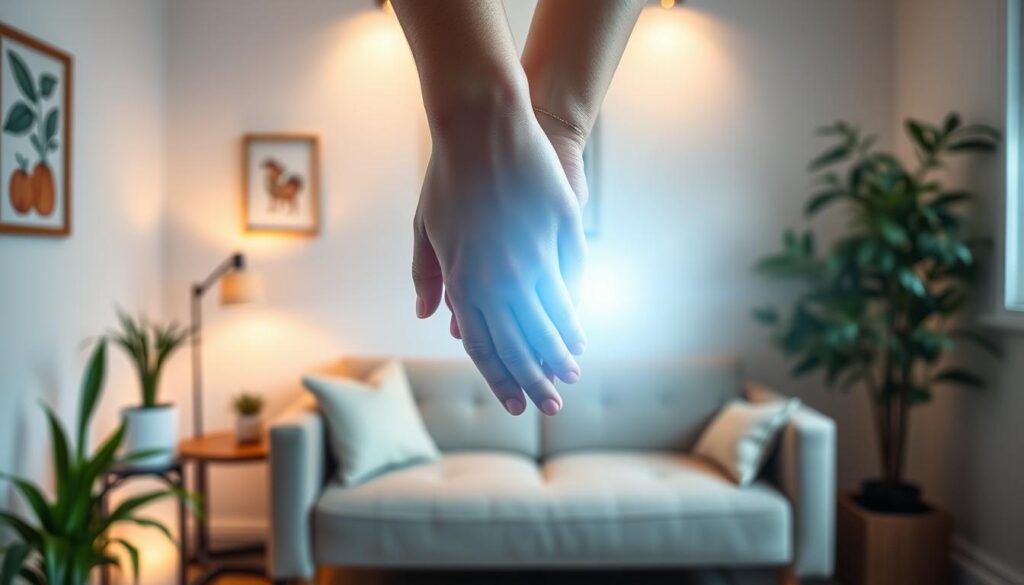Relationship therapy is a strong tool for fixing conflicts and making relationships better. It needs both partners to work hard and be committed. The success of couples therapy depends on the therapist’s skills, when it happens, and how much both partners want to change.
Most people find it helpful, with 97.1% saying they got the help they needed. Up to 80% say it made their relationship better. Emotion-Focused Therapy (EFT) is especially good, with a 75% success rate in fixing marriages.
Couples therapy can change your relationship for the better. It helps you connect with your partner, talk better, and solve many problems. If you’re dealing with cheating, money issues, or just want to feel closer, therapy can help. It’s a safe place to heal and grow together.
Key Takeaways
- Couples therapy has a high success rate, with up to 80% of clients reporting a positive impact on their relationships.
- Emotion-Focused Therapy (EFT) has a 75% success rate in marriage counseling.
- The right therapist and therapeutic approach can significantly influence the effectiveness of relationship therapy.
- Couples therapy addresses a wide range of relationship challenges, from communication issues to infidelity.
- Participating in individual therapy within the context of couples counseling can enhance personal growth and self-awareness.
Understanding the Foundations of Relationship Therapy
Relationship therapy is a team effort. It helps couples face challenges together. First, the therapist checks how the relationship works. Then, they make a plan just for them.
How well therapy works depends on both partners. They must be active and willing to work together.
The Role of Active Participation
Couples who really want to work on their relationship do better. They need to be open and honest. They should use what they learn and do the tasks given.
Setting Realistic Expectations
Therapy usually tackles specific problems in six sessions. But deeper issues might need more time, up to 12 sessions or more.
Types of Relationship Issues Addressed
- Conflict and communication problems
- Infidelity and trust issues
- Parenting and family dynamics
- Intimacy and emotional connection
- Financial stresses and differences
- Mental health challenges
Therapy can tackle these common problems. It helps couples talk better, solve conflicts, and feel closer. The importance of couples therapy is in giving them the tools for a better relationship.
| Relationship Issue | Therapy Approach | Potential Outcomes |
|---|---|---|
| Communication Difficulties | Couples Counseling | Improved communication, conflict resolution skills |
| Infidelity and Trust Issues | Emotionally Focused Therapy (EFT) | Rebuilding trust, emotional reconnection |
| Parenting Challenges | Family Therapy | Enhanced family dynamics, co-parenting strategies |
| Intimacy and Emotional Connection | Behavioral Couples Therapy (BCT) | Improved physical and emotional intimacy |
The impacts of relationship counseling are big. It helps couples deal with their relationship’s complexities. They can build a stronger, more loving bond.
“Relationship therapy gives us the tools to talk better, solve problems, and feel closer. It has changed our relationship for the better.” – Rachel B., 32
Does Relationship Therapy Work: Success Rates and Evidence
Marriage counseling and couples therapy are very effective. Studies show that close relationships make us happier. Clients really like the help they get from therapy.
97.1% of surveyed clients said therapy helped them. Up to 80% saw their relationships get better. Emotion-Focused Therapy (EFT) has a 75% success rate. These numbers show therapy works well in fixing and strengthening relationships.
Research backs up the good things about couples therapy. It shows that unhappy partners often have mood or anxiety issues. Also, unhappy couples can harm their kids’ health and happiness.
| Relationship Therapy Statistics | Success Rate |
|---|---|
| Clients reporting receiving needed help from couples therapy | 97.1% |
| Clients reporting positive impact on their relationships | Up to 80% |
| Emotion-Focused Therapy (EFT) success rate in marriage counseling | 75% |
There’s a lot of proof that couple therapy works. It shows how marriage counseling success rate and how effective is couples therapy in fixing and improving relationships.

“Couple therapy has broadened its conceptual framework to incorporate feminism, multiculturalism, and a broader view of gender and sexuality.”
The Therapeutic Process and What to Expect
Understanding the relationship therapy outcomes is important. The journey starts with an initial assessment. Here, the therapist learns about your background and why you’re seeking help.
They also learn about the issues you and your partner want to fix. This helps create a plan just for you.
Initial Assessment and Goal Setting
In the first session, the therapist looks at how you communicate and solve problems. They might talk about attachment styles, values, trust, and money issues. You and your partner will set goals for the therapy together.
These goals will be checked on during your sessions. This helps see how you’re doing.
Session Structure and Duration
The first session usually lasts one to two hours. The therapist might give you homework to do before the next session. This homework could be reading or exercises.
Later sessions are shorter but still very important. They help you and your partner feel safe. You can then talk about your concerns and work on solving them.
Building Trust with Your Therapist
Building trust with your therapist is key for relationship counseling to work. They listen well and notice how you communicate. They also help you practice new skills between sessions.
Your effort and commitment are crucial for getting the benefits of relationship counseling.
“Research conducted by the American Association of Marriage and Family revealed that over 97% of surveyed couples believe they acquired the necessary help from couples therapy.”

The therapeutic process needs effort from both partners. But the rewards are worth it. By being open and willing to grow, you can get the most out of relationship therapy outcomes.
Key Factors That Influence Therapy Success
When it comes to couples counseling, many things matter. How much both partners want to work on their issues is key. Even in tough times, couples can do well if they both want to improve.
The couples therapist is very important too. A good therapist can spot and help change bad patterns early. They help partners talk and find solutions, not tell them what to do.
- When to start therapy is also important. It’s better to seek help early, before problems get worse.
- Having friends and family support can help too. But it’s important to keep the focus on fixing the relationship, not splitting up.
The importance of couples therapy is huge. It gives a safe place for partners to tackle their problems. By understanding each other better, couples can build a stronger, happier relationship.
“The therapeutic relationship is identified as the most important common factor in successful outcomes, according to research.”
Good relationships are built on trust and understanding. It’s about feeling and making sense of our pain to heal and grow.
In short, couples counseling works because of many things. Partners’ commitment, the therapist’s skill, and when they start are all important. With these, couples can start a journey to a better, stronger relationship.
Individual Therapy’s Role in Relationship Healing
Individual therapy is a big help in fixing relationships. It lets each person work on their own issues. This helps them grow and understand their feelings better.
It also helps them deal with past hurts that might be causing problems. This way, they can talk better and handle relationship issues.
Personal Growth and Self-awareness
Therapy is a safe place for people to look at themselves. They can learn about their feelings and actions. This helps them understand themselves better.
With this knowledge, they can improve how they act in their relationship. They can handle their feelings and talk about their needs.
Addressing Past Trauma
Old traumas can hurt relationships. Therapy gives a safe space to deal with these issues. It helps people feel better and move on.
They learn to handle their feelings and find healthy ways to cope. This helps them stop old patterns that hurt their relationship.
Emotional Regulation Skills
Being able to control emotions is key in a good relationship. Therapy teaches people how to handle their feelings. They learn to be aware of their emotions and manage them well.
This helps them deal with conflicts better. They can be more understanding and build trust with their partner.
While couples therapy works on the relationship, individual therapy focuses on personal growth. It helps each person improve themselves. This makes relationships stronger and more fulfilling.
Choosing the Right Therapeutic Approach
When it comes to how effective is couples therapy or the benefits of relationship counseling, picking the right method is key. Each approach has its own way of helping couples. Emotion Focused Therapy (EFT) and the Gottman Method are two popular ones.
EFT puts emotions at the heart of relationships. It helps couples understand and care for each other’s feelings. The Gottman Method, on the other hand, helps with many issues like fighting and communication problems.
Knowing about these methods helps couples see how they can help. Therapists use different roles, like advisors or coaches, depending on the method. Choosing the right approach can make a big difference in a couple’s relationship.
| Therapeutic Approach | Key Focus | Common Issues Addressed |
|---|---|---|
| Emotion Focused Therapy (EFT) | Emotions as the center of individual needs and relationships | Emotional awareness, compassion, and security within the partnership |
| Gottman Method | Versatile approach addressing a wide range of couple’s issues | Conflict, communication problems, infidelity, parenting challenges |
“Choosing the right therapeutic approach is crucial for addressing the unique needs and challenges of each couple, ultimately leading to more effective and lasting solutions.”
Understanding the different therapeutic options helps couples make a smart choice. This choice can lead to a stronger and more fulfilling partnership.
Common Challenges and Overcoming Resistance
Relationship therapy can help heal, but it faces challenges. One big problem is resistance. About 60-70% of couples start therapy feeling hesitant or unsure.
When One Partner is Reluctant
If one partner is hesitant, gentle words can help. Talk about the good things therapy can do. Listen to their worries, like cost or feeling weak.
Start with easy talks to make them feel more at ease.
Managing Trust Issues
Trust problems often come from past hurts. They can block therapy progress. Sometimes, seeing a therapist alone is needed to fix trust.
Building a good relationship with the therapist helps too.
Dealing with Past Hurts
Past hurts and resentments can hold you back. The Trust Revival Method by Drs. John and Julie Gottman can help. It has steps to heal and rebuild trust.
With patience, commitment, and a good therapist, you can can therapy save a relationship. It can make your partnership stronger and more joyful.


A Life-Changing Experience with This Weight Loss Supplement (Nagano Tonic)
I’ve always struggled with finding a weight loss solution that actually works for me. Like many, I’ve tried numerous diets, exercise routines, and supplements over the years—some worked for a short time, but nothing ever gave me long-term results. That was until I decided to try the weight loss supplement I found : Link to the Supplement.
From the moment I started using it, I noticed a difference. Not only did I feel more energized, but my cravings also became more manageable. The best part? I started seeing results much quicker than I anticipated! Over the course of just a few weeks, I noticed a significant reduction in belly fat and overall weight loss that I hadn’t been able to achieve before.
What makes this supplement stand out from all the others I’ve tried is how it supports me in my daily routine without any jitters or energy crashes. I’m able to stay focused and motivated, which has made it easier to stay on track with my diet and exercise plan.
This product truly exceeded my expectations, and I feel more confident and healthier than ever before. If you’re struggling with your weight loss journey like I was, I highly recommend giving this supplement a try. It’s been a game-changer for me, and I’m sure it can work wonders for you too!
Contant Them on email .. tonicnagano50@gmail.com
I’ve tried so many weight loss products over the years, but nothing worked like this supplement! Since I started using it, I’ve noticed a big difference in my energy levels and appetite control. In just a few weeks, I’ve lost weight and feel so much better. It’s been easy to stick with, and the results speak for themselves. Highly recommend this to anyone looking to make a real change!
I was skeptical at first, but this supplement has truly made a difference in my weight loss journey. I’ve lost weight without feeling deprived or sluggish. My cravings are under control, and I feel more confident in my body. It’s easy to incorporate into my daily routine, and the results speak for themselves. I’m so glad I gave it a try!
Thanks David, i do use the link to make my purchase. you can get too here http://surl.li/iasppy
wasn’t sure what to expect, but this weight loss supplement has really impressed me! After just a few weeks of use, I’ve already dropped a few pounds and feel more motivated to stay active. It’s helped curb my cravings and boosted my energy throughout the day. I’m excited to keep going and see even better results. Definitely worth trying!
Reach them on tonicnagano50@gmail.com
I’ve tried so many weight loss products, but this one has been by far the most effective. In just a few weeks, I’ve noticed a visible difference in my body and energy levels. It’s helped me stay on track without the constant hunger pangs and cravings. I’m really happy with my progress and can’t wait to see where I’ll be in another month!
This Nagano Tonic has been amazing! In just a few weeks, I’ve lost weight, feel more energized, and my cravings are under control. Highly recommend it!
Thats the link to purchase http://surl.li/iasppy